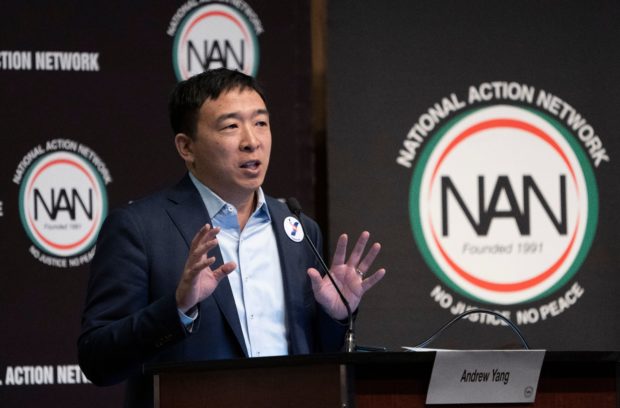Democratic presidential candidate Andrew Yang on Tuesday theorized that his proposal to pay every American adult $1,000 per month would actually result in “more than 2 million jobs.”
WATCH:
After explaining Yang’s universal basic income proposal to viewers, Fox News anchor Bret Baier asked pointedly, “How do you make that work?”
Yang noted the fact that major companies like Amazon pay little or no taxes, then said his proposal could be paid by “harnessing the gains from innovations in new technologies that are being enjoyed by companies like Amazon, Google, Uber, Facebook and on and on.”
“How do you answer that?” Baier asked, after playing a clip of former Vice President Joe Biden commenting on the “dignity” of work. “You are taking away that dignity, that respect of having a job.”
Yang argued that his proposal was actually “very pro-work.”
The ‘Freedom Dividend’ is actually very pro-work, because putting this money into American hands, that money would circulate over and over through their neighborhoods and communities. It would create more than 2 million jobs around the country and would also recognize a lot of the work that’s being done in our families and communities that is not being recognized by the market — which includes people like my wife who is at home with our two children, one of whom is autistic. And right now the market values her work at zero.
“How do you pay for this without taking us over the ledge?” Baier asked.
Yang contended that his proposal would build a “trickle-up economy” that will make business stronger, then reiterated his call for a value added tax.

Democratic Presidential candidate Andrew Yang speaks during a gathering of the National Action Network on April 3, 2019 in New York. (Photo by Don Emmert / AFP) (Photo credit should read DON EMMERT/AFP/Getty Images)
“But again, if you want to try and balance the budget, which I agree we need to do, we need to look at who the biggest winners are in this economy. And so companies like Amazon and Netflix are paying zero in federal taxes: Of course you’re gonna have big deficits,” he said. “We have to join every other advanced economy in the world and have a mechanism that prevents trillion-dollar companies from paying zero in taxes, which is why I am proposing a value added tax that every other major economy has already adopted.”
“The opposite of Donald Trump is an Asian man who likes math,” Yang told a group of supporters last month. The self-professed entrepreneur’s “Freedom Dividend” would give every American $1,000 per month. (RELATED: Andrew Yang Predicts White People Will Shoot Up Asians)
“The government is not capable of a lot of things, but it is capable of sending large numbers of checks to large numbers of people promptly and reliably,” Yang’s website reads. “We have plenty of resources, they’re just not being distributed to enough people right now.”
Many economists, however, are doubtful about Yang’s proposals. As an example, Roosevelt Institute research director Marshall Steinbaum argues that a value added tax (VAT) would actually undermine the concept of a universal basic income because it would simply raise prices on the poor.
“If the point of the universal basic income is to rectify wage stagnation, poverty, or to have some sort of response to rising inequality, that’s great,” Steinbaum told CBS MoneyWatch. “But if we pay for it with a VAT, you undo all of those gains because you’re causing poor people to pay for this, which undermines the argument for why we need a UBI to begin with.”
Further, in a FEE.com article titled “Andrew Yang’s Math Doesn’t Add Up On Universal Basic Income,” Jacob Dowell argues that it’s actually the production of capital goods driven by savings, not consumption — which a universal basic income would drive — that grows an economy.


